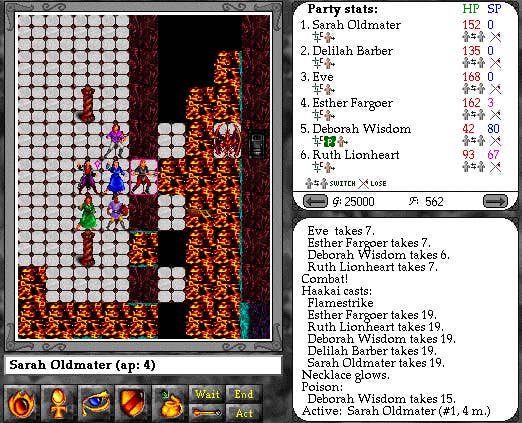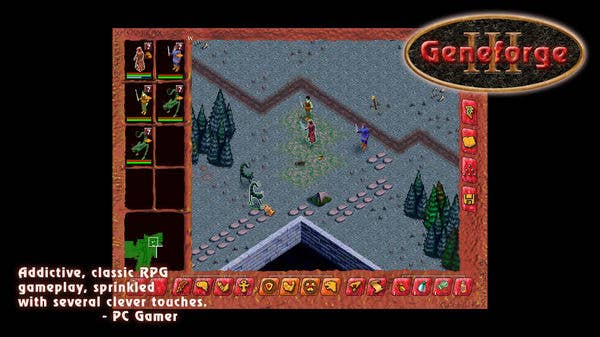"Innovation is not the only path"
Spiderweb Software founder Jeff Vogel has been making indie games for 24 years, and he has some ideas on how others can do the same
In his 24 years of continuous indie game development, Spiderweb Software's Jeff Vogel has learned a few things. In a talk at the Game Developers Conference Independent Games Summit today, he shared some of those things, with the caveat that they may only apply to him and his career, may not be true forever, and may not even be true now.
"Video games are young," Vogel stressed. "Nobody knows anything. We're still scrambling to figure out, 'How do we design these things? How do we create these things? How do we test these things? How do we sell these things? How do we market these things? How do we add loot boxes to our $100 million project without causing it to blow up on the launch pad?'"
Vogel framed his talk as a walk through his personal career in game development, including the creative genesis of his very first video game project.
"It didn't take me long," Vogel said. "I came up with an idea. I loved these games as a kid, so what I'm going to do is I'm going to go to every single game I liked as a kid, and steal the single best idea from every one. And in my crasftsman way, I'm going to amalgamate them into what I hope is a cohesive and satisfying whole."

He added, "Indie games are great for innovation. I love innovation, but innovation is not the only path. You must remember that every single one of us stands on the shoulders of giants. I looked at what I liked to play and I copied it. That is my creative process."
He implored other developers in the audience to find a creative process similarly personalized to their own needs.
"If there's something rubbing at you, something that's putting you off your feed? Over the next 40 years, it is going to rub you down to a nub"
"This is going to sound like artsy fartsy, 'Oooo, follow your bliss, man!' advice, but no, it's not," Vogel insisted. "It's very hard-nosed, practical advice, and I'll tell you why."
As Vogel sees it, most people think about their careers in game development on a scale of one to five years. And for someone just starting out, that may seem like a reasonable thing to do. But it also helps to consider what happens when you consider trying to make a full career in indie game development, stretched across 40 years or more.
"That's a long time," Vogel said. "If you're going to work for that length of time, you're going to be operating at a peak level of efficiency--because you need to in this business--you need to create a life, a mindset, a process that is not going to rub at you. Because if there's something rubbing at you, something that's putting you off your feed? Over the next 40 years, it is going to rub you down to a nub."
Vogel's process wasn't just amalgamating other people's good ideas. He also set his quality threshold at the only level better than good: good enough. His formula for sequels was to look for the worst 25% of the previous game and work on improving that. He is "merciless" about reusing assets, code, and engines, and insisted that developers should never let anyone shame them out of being cheap. He estimated that he used the same wolf icon in 15 different games.
"People make fun of me for it all the time, but I am also still in business," Vogel said.
While Spiderweb's games built up an audience and were reasonably well received, they developed a reputation for being not terribly attractive.
"I was getting really sick of everyone telling me, 'Your graphics suck. Your graphics suck. Your graphics suck,'" Vogel said. "So I spent some actual money. I hired actual artists and get graphics that are somewhere on the same continent as the standard graphics of the time. The result of course, was that every day people told me, 'Your graphics suck. Your graphics suck. Your graphics suck.' That was the last time I ever made the mistake of making an effort."
"Often the people who are angriest at you are not going to be completely anonymous. They're going to be the people who five years ago were your most devout fans"
That sort of criticism is also a fact of life for indie developers, Vogel said. A certain amount of humanity (he suggested 10% of absolutely any demographic) is just going to be mean, or make unreasonable demands. And while it's common enough for people to ascribe that sort of toxicity to the anonymous nature of the internet, Vogel said doing telephone support and sales for his games in the days before platforms like Steam convinced him that there's no shortage of people willing to be angry and mean to people in more direct conversation.
"Often the people who are angriest at you are not going to be completely anonymous," Vogel said. "They're going to be the people who five years ago were your most devout fans. And then you changed the thing, and it was their favorite thing, and now they don't like you anymore. Remember there is always a very thin line between love and hate."
That brings up another consideration if one's thinking about indie game development as a 40-year career, as Vogel said it's important to shelter one's brain from all avenues of assault. While acknowledging that as a white male, he gets less abuse than others, what is directed his way is still plenty to affect him. As a result, he doesn't look at Steam reviews of his games. He doesn't visit forums. He quits Twitter if people are being mean to him and logs back on later "when the coast is clear." And if a relationship with a customer is turning south, he's not reluctant to end it.
"Don't be afraid to fire a customer," Vogel said. "They say that the customer is always right. That's not true. Customers are wrong all the time. The difference is that nobody ever won an argument with a customer. There are times where you're going to have to say to someone, 'Look, my thing isn't for you. I can't add that feature. I can't write that expansion. I just can't do the thing you want.' Offer them a refund and send them on their way.
"If someone is on the forums and you can see that they're just there to cause trouble, ban them! If people are making noise, 'That person isn't screwing up your business, you shouldn't have banned them,' then ban them too! The beatings will continue until morale improves! ...People who are nice and support you will understand."

Like any studio, Spiderweb Software has had its ups and downs. Vogel pointed to 2004 as one particularly rough year after two of its titles--Blades of Avernum and Geneforge 3--didn't connect with players. Geneforge 3 in particular suffered from a bit of complacency, Vogel said.
"Once again, here's some advice that seems artsy. 'Oh yeah, you always have to be growing as a human, man. And have you ever looked at your hands?' No. You have to be growing as an artist, and this is hard-nosed, practical advice," he said. "Because for the most part, we're toy makers. We sell amusements. We sell things that tickle people's brains. We sell surprise. And complacency and predictability and repetition are the death of that. If you want to write a sequel, great. But your sequel better do something new. And it better introduce that new thing early. Because if people go, 'Yeah, I've done all this and I don't need to do all of this,' you're going to start bouncing checks."
Vogel saved perhaps the most universally applicable advice for last.
"Don't be proud of not getting enough sleep. You need sleep to live," he reminded the audience. "And get a chair that's good for your back. Because when your back goes, my god you're going to miss it."








